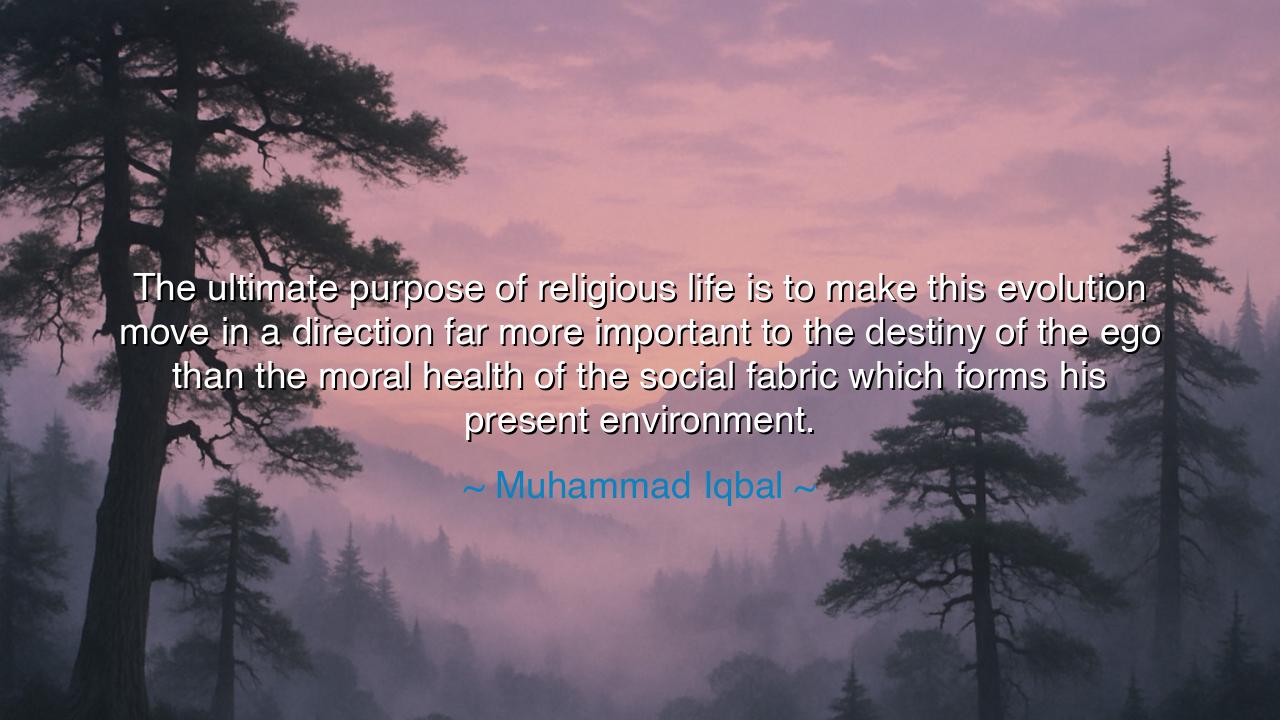
The ultimate purpose of religious life is to make this evolution
The ultimate purpose of religious life is to make this evolution move in a direction far more important to the destiny of the ego than the moral health of the social fabric which forms his present environment.






“The ultimate purpose of religious life is to make this evolution move in a direction far more important to the destiny of the ego than the moral health of the social fabric which forms his present environment.” — Muhammad Iqbal
Hear, O seeker of truth, the voice of Muhammad Iqbal, the philosopher-poet of the East, whose words gleam like stars in the night sky of thought. In this profound saying, he unveils a mystery that transcends the walls of temples and the pages of doctrine — that religious life is not merely a code of conduct meant to preserve the order of society, but a path of inner evolution, a journey through which the ego — the self, the soul, the conscious flame within man — is transformed and exalted. To Iqbal, the destiny of the ego is higher than the comfort of conformity; it is the unfolding of divine potential within the human heart. For religion, when rightly understood, does not end in the preservation of morality alone, but strives toward the awakening of the spirit and the creation of the self as a reflection of the Infinite.
The origin of this quote lies in Iqbal’s vision of spiritual evolution, a vision born from the union of faith and philosophy. Living in an age of colonial turmoil and spiritual confusion, he sought to remind his people — and all of humankind — that religion is not a mere ornament of civilization, nor a servant of social custom. It is, rather, the engine of transformation that propels the human soul toward its divine purpose. The moral health of the social fabric — that is, the stability of laws, customs, and norms — is indeed necessary, but it is not the summit of faith. For Iqbal, the highest purpose of religion is not simply to create order, but to ignite creative energy within the individual — to awaken man to his role as co-creator in the unfolding story of existence.
In his understanding, the ego is not an illusion to be destroyed, as some mystics believed, but a divine trust to be cultivated. It is the center of consciousness that reflects God’s creative power. When Iqbal speaks of evolution, he does not refer only to the physical transformation of species, but to the inner evolution of the self — the ascent from ignorance to knowledge, from weakness to will, from fear to divine courage. The truly religious life, then, is one that guides this ascent: it is the process of shaping the self until it stands firm before both fate and eternity, radiant with self-mastery and awareness of God.
Consider, O listener, the story of Abraham, the friend of God, who shattered the idols of his people. His act was not a rebellion against social morality alone, but a declaration that the destiny of the ego lies in surrendering to truth beyond the conventions of the age. His society prized its “moral fabric” — the customs of worship, the rites of tradition — yet Abraham saw that these served not the spirit, but stagnation. When he walked into the fire of Nimrod, he demonstrated what Iqbal means by evolution: the transformation of the self from submission to fear into unity with the Eternal Will. Such souls are the architects of human destiny, for through their awakening, the whole race ascends.
Iqbal’s words also carry a challenge to those who mistake religion for mere ritual or social regulation. He reminds us that the value of faith lies not in outward conformity, but in inward growth. A society that praises morality but neglects the inner life becomes hollow, for its righteousness is mechanical and its virtue lifeless. True religion, he teaches, is not satisfied with creating good citizens; it seeks to create whole beings — men and women whose souls burn with the divine light, whose will reflects the creative purpose of God. It is through such individuals that civilizations are reborn and new moral worlds are shaped.
The lesson, then, is both personal and universal. Each soul must see religion not as a set of boundaries, but as a path of becoming. One must not stop at obedience, but strive toward understanding; not rest in piety, but rise in power of character. Ask yourself — does your faith merely restrain you, or does it elevate you? Does it preserve the old, or does it awaken something eternal within you? For as Iqbal declares, the destiny of man is not servitude, but self-realization, the discovery of the divine within the human.
Therefore, O traveler of spirit, take heed of this wisdom: let your religion not be a cage, but a wing. Seek not merely to preserve the world as it is, but to evolve it through your own transformation. Cultivate the ego, not in arrogance, but in divine strength, that it may reflect the glory of its Creator. Remember that the moral health of society is but the shadow — the true light is the awakened soul. When enough hearts burn with such awareness, the fabric of civilization will not merely be mended — it will be transfigured, woven anew with threads of truth, courage, and the everlasting light of God.






AAdministratorAdministrator
Welcome, honored guests. Please leave a comment, we will respond soon